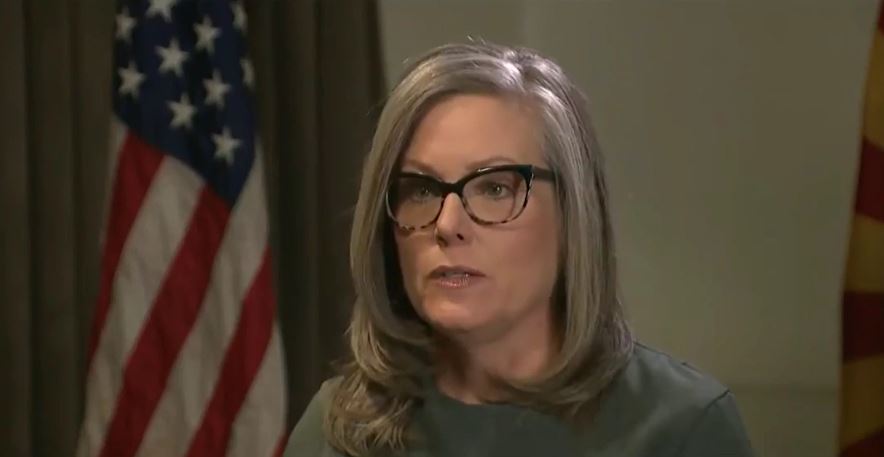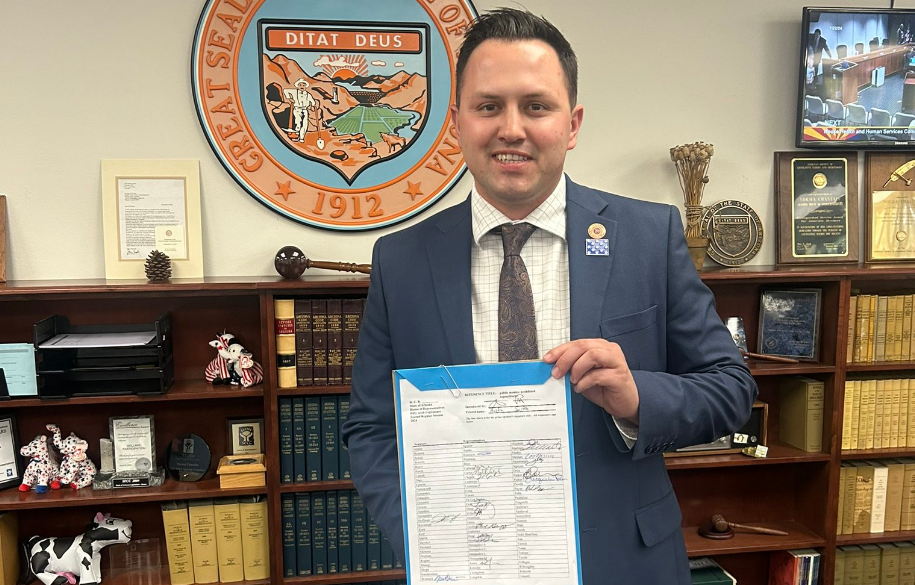
by Staff Reporter | Jan 11, 2026 | News
By Staff Reporter |
A new bill to increase the penalty for assaulting ICE agents became more timely in light of recent events.
The Protect and Respect ICE Act, or “PRICE” Act, was introduced last September. Arizona Congressman Abe Hamadeh assisted with shaping and rolling out the bill.
The bill amends Section 111 of Title 18 of the federal code. Individuals who forcibly assault, resist, oppose, impede, intimidate, or interfere with any individual engaged in or on account of the performance of official duties would have their punishment doubled.
“In the case of [violence] committed against an officer or employee of U.S. Immigration and Customs Enforcement, the applicable maximum term of imprisonment under this section shall be doubled, and the applicable maximum fine shall be adjusted accordingly,” stated the proposed bill.
On Thursday, the Department of Homeland Security (DHS) issued a notice that attacks against ICE officers increased by an “unprecedented” 1,300 percent. Vehicular attacks on agents increased by 3,200 percent.
Officials reported nearly 300 assaults on ICE agents last year, compared to less than 20 under the final year of the Biden administration in 2024. Additionally, there were nearly 70 vehicular attacks on ICE agents last year. In 2024, there were only two.
DHS Assistant Secretary Tricia McLaughlin blamed rhetoric from the “sanctuary politicians”: state and local leadership attempting to thwart immigration enforcement efforts.
“This unprecedented increase in violence against law enforcement is a direct result of sanctuary politicians and the media creating an environment that demonizes our law enforcement and encourages rampant assaults against them,” said McLaughlin. “Dangerous criminals — whether they be illegal aliens or U.S. citizens — are assaulting law enforcement and turning their vehicles into weapons to attack law enforcement.”
DHS provided some examples of the end results of assaults on ICE agents. One ICE officer sustained a gaping wound on his mouth after an illegal immigrant hit him with a metal coffee cup, and another ICE officer was bitten while arresting an individual.
Multiple groups of ICE officers have endured near-fatal or fatal shootings during enforcement efforts. Multiple officers have been in car wrecks after being targeted by anti-ICE activists and illegal aliens.
Increased aggressions have resulted in deadlier encounters for both ICE agents and activists.
DHS issued their press release the day after an “ICE Watch” activist, Renee Nicole Good, was shot by ICE agents in Minneapolis, Minnesota, after driving her vehicle toward an agent. It is believed Good was attempting to evade apprehension by agents during an immigration enforcement effort. Good moved to Minneapolis last year.
Minnesota’s ICE Watch activists operate by tracking and disrupting ICE raids throughout the city. Good’s wife, a woman named Rebecca Good, was also present to resist ICE immigration enforcement efforts.
As claimed by DHS, Anti-ICE Minnesotan activists like Goodwin were acting consistently with the rhetoric of their elected leaders. Minnesota Governor Tim Walz called ICE the “Gestapo.” Minneapolis Mayor Jacob Frey responded to Good’s shooting by demanding that ICE “get the f**k out of Minneapolis.”
The New York Post reported that Good was active with the anti-ICE group through her child’s “social justice education” charter school.
The pair moved to Minneapolis after briefly leaving the country for Canada following President Donald Trump’s election in 2024, per KMBC.
The shooting remains under investigation.
AZ Free News is your #1 source for Arizona news and politics. You can send us news tips using this link.

by Ethan Faverino | Jan 11, 2026 | News
By Ethan Faverino |
Arizona House Speaker Steve Montenegro announced last week, the establishment of two new House committees for the 57th Legislature’s Second Regular Session. The move reflects a proactive effort to address emerging technologies and the distinct needs of Arizona’s rural communities as lawmakers assemble on January 12.
In announcing the decision, Montenegro said, “Arizona lawmakers cannot afford to be passive while technology reshapes our economy and government. At the same time, rural communities deserve policies that recognize their role in feeding, powering, and supporting this state.”
Rep. Justin Wilmeth (R–LD 2) will chair the newly established House Committee on Artificial Intelligence and Innovation, with a focus on responsible policymaking in the rapidly evolving field of AI.
“Artificial intelligence has become a powerful engine for our nation’s economy, and it’s here to stay,” said newly appointed Chairman Wilmeth. “With the creation of the AI and Innovation Committee, the legislature is signaling that policymakers are evaluating their role in the future of Arizona: creating high-skill jobs, attracting new investment, and strengthening existing industries from semiconductors to healthcare. As Chairman, I hope to create a forum where experts, industry leaders, and members of the public can share their perspectives, knowledge, and concerns so we can create informed and effective legislation. Our state’s future competitiveness depends on embracing AI and supporting the innovators who choose to build and grow here.”
Rep. Teresa Martinez (R–LD 16) has been appointed chairwoman of the House Committee on Rural Economic Development, which will focus on all policies affecting rural jobs and local investment.
“Too often, policies are written without considering how they affect rural Arizona,” said Chairwoman Martinez. “I intend for the Rural Economic Development Committee to closely examine how state decisions impact jobs, infrastructure, water access, and local investment—and to advance policies that help rural communities grow, compete, and keep opportunity close to home.”
Both committees will meet on Thursdays at 9:00 a.m., The new legislative session opens on January 12.
Ethan Faverino is a reporter for AZ Free News. You can send him news tips using this link.

by Matthew Holloway | Jan 11, 2026 | News
By Matthew Holloway |
A federal judge has allowed key claims to proceed in the civil rights lawsuit filed by Rebekah Massie, a Surprise, Arizona, resident who was arrested after criticizing a city attorney’s salary during a city council meeting.
According to the Foundation for Individual Rights and Expression (FIRE), Judge Roslyn O. Silver of the U.S. District Court for the District of Arizona ruled this week that Massie’s First Amendment, Fourth Amendment, and Arizona Open Meeting Law claims will move forward into discovery. The lawsuit stems from an August 2024 city council meeting in Surprise, where Massie was removed, arrested, and charged with trespassing after criticizing the pay of a government attorney during public comment. She was later taken to a detention center.
FIRE said the city did not challenge Massie’s federal constitutional claims in its motion, allowing those claims to proceed. The judge also permitted Massie’s Open Meeting Law claim to move forward, noting that Arizona law places express limits on how government bodies may regulate public comment during meetings.
Several state law claims were dismissed, according to FIRE, after the court determined they were duplicative of the constitutional claims and barred under Arizona’s notice-of-claim statute.
FIRE attorney Adam Steinbaugh said the organization will continue pursuing the case.
“We’re going to continue to fight not only to vindicate Rebekah’s constitutional rights, but to ensure that all Arizonans are free to speak their minds. All of us have the right to criticize our government without being arrested.”
The ruling marks the latest development in a case that has already prompted changes from the City of Surprise.
In September 2024, the Surprise City Council voted to repeal its policy prohibiting criticism of public officials during meetings following public backlash and the filing of the lawsuit. The following month, a judge dismissed the criminal trespassing charge against Massie, calling the government’s suppression of her speech “objectively outrageous.”
According to FIRE, body-camera footage later released showed a Surprise police officer responding to Massie’s complaint that she had been thrown to the ground during her arrest by saying, “That’s what happens when you’re resisting arrest.”
The civil lawsuit against the City of Surprise and individual officials remains ongoing as the case enters the discovery phase.
Matthew Holloway is a senior reporter for AZ Free News. Follow him on X for his latest stories, or email tips to Matthew@azfreenews.com.

by Staff Reporter | Jan 10, 2026 | News
By Staff Reporter |
Congressman Andy Biggs is revisiting the promises allegedly broken by Governor Katie Hobbs to kick off the 2026 election fight. Biggs is seeking to unseat Hobbs.
Many of those allegedly broken promises had to do with Hobbs’ claims of bipartisanship. Hobbs promised repeatedly on the campaign trail that she would work with Republicans on certain issues.
One of those promises was that she wouldn’t veto a ban on food taxes.
Hobbs told Arizona PBS that she wouldn’t prioritize partisanship over good policy.
“I’m not going to say no to anything if there’s a way to provide relief for Arizonans,” said Hobbs.
However, within months of taking office Hobbs vetoed a Republican-led bill to ban taxation on food. In her veto letter, Hobbs said the municipalities’ concerns about funding sources without a food tax were reasonable, and that the elimination of the tax wouldn’t take place immediately or eliminate overall costs for residents anyhow.
“From potential cuts to service — including public safety — to increased property taxes, it’s clear that this bill doesn’t actually eliminate costs for our residents. It simply moves those costs around,” wrote Hobbs.
Hobbs also claimed she wouldn’t support a food tax ban because federal welfare recipients, being tax-exempt, wouldn’t feel any of the benefits of a tax elimination.
“[This bill] does nothing for the more than 800,000 Arizonans who use SNAP and WIC benefits for their groceries, as these constituents are already exempt from the tax,” said Hobbs.
Governor Hobbs’ party-line approach to the state’s executive branch as evidenced by the food ban veto has prompted criticisms and friction with the GOP-controlled legislature. The results have devastated many of the priority bills favored by House and Senate Republicans. The governor has repeatedly broken records for the highest number of vetoes in a single legislative session and executive term.
Hobbs vetoed over 180 bills after her first year in office, and again around 180 bills this past year in 2025. Previously, the record high was 181 vetoes — but over the course of six years under former Governor Janet Napolitano, the last Democrat to hold the office before Hobbs.
When Hobbs initiated efforts for her reelection campaign early last year, she again sought to frame herself as a bipartisan agent.
Hobbs launched a border task force that resembled the one launched by her Republican predecessor, Doug Ducey. This move represented a flip from her initial stance scaling back support for federal immigration enforcement, which included the dissolution of Ducey’s border task force.
Hobbs’ team claimed her border team differed from Ducey’s, but the two were virtually the same.
The governor also restored an agency leader picked by Ducey and dumped by her. Hobbs had initially selected the former Arizona Food Bank Network CEO Angie Rodgers for director of the Department of Economic Security. Hobbs changed her mind early last year and reinstalled Ducey’s pick, Michael Wisehart.
Hobbs also selected another Ducey administration veteran, Katie Ptak, for director over the Department of Child Safety.
AZ Free News is your #1 source for Arizona news and politics. You can send us news tips using this link.

by Ethan Faverino | Jan 10, 2026 | News
By Ethan Faverino |
The Department of Homeland Security (DHS) and U.S. Customs and Border Patrol Protection (CBP) announced that border security metrics have reached new highs in effectiveness, marked by declining encounters, zero releases of apprehended individuals, surging drug seizures, dramatic reductions in Arizona crossings, and major investments in advanced border infrastructure.
Preliminary CBP data for November 2025 showed total nationwide encounters dropping to 30,367—lower than October’s historic low of 30,573—and marked the seventh consecutive month of zero releases into the United States. Every individual that was apprehended by U.S. Border Patrol (USBP) was processed according to law, a milestone described as unmatched in modern border history.
“Once again, we have a record low number of encounters at the border and the 7th straight month of zero releases. Month after month, we are delivering results that were once thought impossible: the most secure border in history and unmatched enforcement successes,” said Secretary Kristi Noem. “Thanks to President Trump’s leadership and the dedication of DHS law enforcement, America’s borders are safer than ever before.”
CBP Commissioner Rodney Scott added, “Our focus is unwavering: secure the border, enforce the law, and protect this nation. These numbers reflect the tireless efforts of our agents and officers who are delivering results that redefine border security. We’re not slowing down. We’re setting the pace for the future.”
Key highlights from the data include:
- The lowest start to any fiscal year on record, with only 60,940 total nationwide encounters in October and November—28% below the previous low of 84,293 in FY2012.
- From January 21 through November, total enforcement encounters along the southwest border stood at 117,105—37% less than the Biden administration’s monthly average of 185,625.
- USBP nationwide apprehensions have averaged under 10,000 per month since President Trump took office.
- Southwest border daily average apprehensions fell to 245 per day—a 95% reduction from the prior administration’s average of 5,110 per day.
Drug interdiction efforts also intensified, with nationwide seizures totaling 54,947 pounds in November—a 33% increase from October. Fentanyl seizures rose 59% to 1,543 pounds, methamphetamine seizures surged 118% to 21,935 pounds, and cocaine seizures increased 40% to 8,420 pounds.
In Arizona, illegal border crossings have plummeted under the current administration. FY2025 saw 63,813 apprehensions, a fraction of the prior years’ totals: 564,215 in FY24, 576,901 in FY23, and 571,720 in FY22.
This represents an approximate reduction of 92% from illegal entries and gotaways during the Biden administration, with FY25 apprehensions 66% lower than those in the Biden era.
To further fortify these gains, DHS and CBP announced five new contracts totaling $3.3 billion for “Smart Wall” construction in Texas and Arizona, bringing the total Smart Wall contracts to $8 billion.
The contracts, issued in November and December 2025, will add 97 miles of primary border wall, 19 miles of secondary wall, 66 miles of waterborne barrier system, and extensive detection technology (including 149 miles in areas with existing barriers).
The Tucson 2 Wall Project will construct approximately 19 miles of primary and secondary wall plus 136 miles of detection technology in Arizona’s Tucson sector.
“Securing our border is key to protecting our country, keeping our communities safe, and making sure our immigration system works the way it should, said CBP Commissioner Rodney Scott. “A border wall with the right technology—a Smart Wall—is an important tool to stop illegal activity and to help agents do their job, which is critical in keeping America safe.”
Ethan Faverino is a reporter for AZ Free News. You can send him news tips using this link.

by Staff Reporter | Jan 10, 2026 | News
By Staff Reporter |
As punishment for forging nomination petition signatures, former lawmaker Austin Smith received probation and a five-year ban on running for office.
Smith received his sentence on Tuesday, which also included a $5,000 fine with a 10 percent surcharge and two years of supervised probation.
The ex-lawmaker entered a plea deal admitting guilt in November to attempted fraudulent schemes, an undesignated offense, and practices and illegal signing of election petitions, a misdemeanor. Smith admitted to forging over 100 signatures.
Smith was a state representative for the 29th district from 2023 to 2025. He was also formerly senior director of Turning Point Action and former chairman of Arizona Young Republicans Federation. Smith stepped down from Turning Point Action and suspended his reelection bid in 2024 after the signature forging allegations against him emerged.
It was one of Smith’s constituents, a Democratic voter named James Ashurst, who filed the complaint in the Maricopa County Superior Court in 2024 against the former lawmaker alleging signature forging. Ashurst’s complaint claimed that over a dozen petition sheets bore the same handwriting from purportedly different voters.
The complaint also included declarations from individuals listed on Smith’s petition sheets swearing they never signed the ex-lawmaker’s petition.
Initially, Smith denied wrongdoing in lengthy public statements posted to since-deleted or privatized social media accounts. Smith characterized the allegations against him as “coordinated” inventions of “two Democratic activists” involved in the political groups within his district.
“It seemed ludicrous because Republicans trying to get on the ballot don’t seek Democrat signatures and would have no reason to forge Democrat signatures, since they don’t count,” said Smith at the time.
The complaint didn’t move forward after Smith dropped out of the race. Tuesday’s outcome came out of prosecution from Democrat Attorney General Kris Mayes.
During Tuesday’s sentencing, Smith’s attorney, Kurt Altman, made an unsuccessful petition for Smith’s probation term to be reduced to one year. Altman said Smith was “mortified” by his decision to forge signatures.
“He’s embarrassed by the lapse in judgment and can be assured by this court he’s not gonna be back here, he’s not gonna have any issues with probation and he’s not gonna run for office again,” said Altman.
Altman also described Smith’s finances as incapable of handling a surcharge in addition to the fine, noting that the ex-lawmaker recently launched an agriculture business and had a child.
Tuesday’s sentencing reflected the outcome of a plea deal which dropped most of the charges against him, over a dozen including several felonies. Smith was indicted last summer.
Attorney General Mayes added in a press release announcing Smith’s sentencing that Smith admitted to attempting to deceive the secretary of state’s office.
“If you try to illegally manipulate Arizona’s elections or mislead Arizona voters, you will be held accountable under the law,” said Mayes. “There are real consequences for cheating the system.”
AZ Free News is your #1 source for Arizona news and politics. You can send us news tips using this link.






